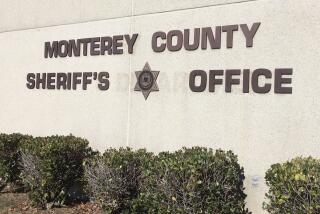Woman pleads no contest to a killing she denies committing
- Share via
For the second time in a decade, Kristi Lyn Lunbery has been convicted of killing her husband with a gunshot to his head while he was sleeping in 1992.
Despite confessing to the crime years ago and now agreeing to a plea deal, Lunbery has insisted throughout her legal odyssey that she didn’t kill her high school sweetheart, the father of two daughters and their young family’s sole support.
Lunbery’s confession came in December 2001, long after Charlie Bateson’s murder had become a cold case, when Shasta County sheriff’s detectives intimated they would take her children away if she didn’t admit to the shooting. She later retracted the confession and entered a not-guilty plea. But that confession, the only significant evidence against her, led to her conviction for second-degree murder and a 19-years-to-life prison sentence.
Seven years into that term, a federal appeals court struck down her conviction, deeming the confession questionable and her trial unfair because a judge excluded all evidence pointing to another killer.
Since her release in September, Shasta County authorities have continued to dismiss the defense theory that Bateson was the victim of a drug hit gone wrong. They were preparing to try Lunbery again for murder, confident they could still get a jury to believe her confession was legitimate.
“We didn’t think that the third-party evidence was reliable and it had been investigated at the time of the murder extensively,” Kelly Kafel, senior deputy district attorney, said when asked if authorities had looked at other suspects, as the U.S. 9th Circuit Court of Appeals had ordered.
Faced with the risk of another conviction and return to prison, Lunbery pleaded no contest to voluntary manslaughter on Monday in a deal that lets her avoid any additional prison time. Lunbery, her mother said, wants to spend time with the two now-adult daughters she had with Bateson and her youngest child, a 15-year-old girl, from a short-lived marriage after Bateson’s death.
“I know the truth,” Lunbery, 41, told reporters after entering the plea. She will be sentenced on May 5 to time served.
“I don’t want to go through it again,” Lunbery said of another murder trial.
Her parents, Ron and Marie Conley, said the small mountain town of Burney they’ve called home for 40 years has been supportive throughout the family’s ordeal.
“Those people who are our friends and her friends are going to believe she’s innocent,” Marie Conley, a retired school secretary, said of the plea deal. “Most people in town have been really, really good. And anybody who says she shouldn’t do this — they don’t know what we’ve gone through over almost 20 years, starting with Charlie being killed.”
Bateson was found dead around noon on April 17, 1992, in the small bedroom of a cottage he and his wife and young daughters had moved into less than two weeks earlier. Lunbery’s grandmother, who owned the cottage, had evicted the previous tenants for dealing drugs and let the Batesons take it over rent-free, so they could catch up on their finances and save for their own home.
Sheriff’s investigators immediately focused their murder investigation on Bateson’s widow, despite finding neither blood nor gunshot residue on her hands or clothing. They subjected her to a lie detector test and repeatedly interrogated her about her trip to an area mall around the time of the killing. Investigators tore out the cottage’s plumbing, looking for trace evidence washed off after the shooting that forensic experts said was likely to have spattered blood and brain matter on the killer. No murder weapon was ever found, nor were other serious suspects identified or questioned.
Among the clues bolstering the bungled execution theory that the trial judge refused to admit were a neighbor’s description of a white Ford Fiesta idling outside the cottage at 3 a.m. on the morning of the killing, a car known to have been driven by a drug dealer reportedly burned by the previous tenant.
Other testimony excluded from the jury was a local man’s report that the drug dealer, Henry Garza, had commented after Bateson’s killing that “my partners blew away the wrong dude.” Nor did jurors hear from the confidential police informant who had told investigators that the shotgun blast that killed Bateson was probably intended for the evicted tenant. Garza was dead by the time of Lunbery’s 2004 trial, and sheriff’s deputies claimed the other witnesses couldn’t be found.
Jeff Gorder, Lunbery’s public defender, also decided against calling a UC Berkeley sociologist, Richard Ofshe, who had examined Lunbery and deemed her highly vulnerable to making a false confession to escape the stress of the interrogation.
More to Read
Sign up for Essential California
The most important California stories and recommendations in your inbox every morning.
You may occasionally receive promotional content from the Los Angeles Times.













